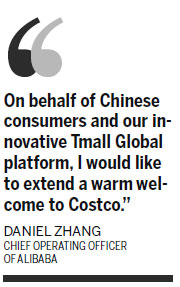Costco joins Alibaba's big online portal
Costco Wholesale Corp, known primarily for its US membership-only warehouse clubs, is entering the Chinese mainland without a store. It will sell food and household items to Chinese consumers on TMall, the business-to-consumer portal of Alibaba Group.
The venture announced on Monday will be Costco's first foray into China. David Strasser, an analyst at Janney Montgomery Scott LLC in Philadelphia, said this will enable Costco to enter the Chinese market without putting up capital to build stores in the country.
Several Western retailers, including Zara owner Inditex, the world's largest fashion retailer, Britain's Burberry and ASOS, have joined TMall this year to boost their presence in China.
"The Tmall platform allows foreign brands to reach Chinese consumers without a physical presence, while also allowing them to preserve their unique identity and merchandising strategies. This low capital entry will give (Costco) a good look at the Chinese opportunity with nominal capital investment. (Costco) will initially sell food and healthcare products," Strasser wrote in a research note provided to China Daily.
Alibaba, founded by Jack Ma in 1999, has grown into one of the largest e-commerce behemoths in the world and now controls 80 percent of all online retail sales in China.
Costco has reported slowing same-store sales growth for the last three years, and has been increasing its online presence to boost sales.
"(Costco) has re-platformed the website, introduced mobile apps, stepped up initiatives to improve online functionalities and added SKU's (Store keeping unit or service identification code) across four countries (US, Canada, UK and Mexico), but more is to come, including an entry into one or two new countries over the next year,"Strasser said in the note. "IT spending at (Costco) has risen over the past two years."
Costco will introduce new products and brands to Chinese consumers while Tmall.com's bonded warehouse model will help Costco reduce logistics costs and shorten delivery time, the companies said in a press release.
In Asia, there are 19 Costco warehouses in Japan, 11 in Korea and 10 in Taiwan.
According to a research note from Zacks Equity Research and the global management consulting firm Boston Consulting Group, Chinese Internet users will soar to 730 million in 2016 from 460 million in 2010.
Zacks said the number of online shoppers in the country is expected to reach 380 million in 2016, up from 145 million in 2010. Overall, the e-commerce industry should account for 7.4 percent of China's total retail value by 2015, up from 3.3 percent in 2011. It took the US almost a decade to reach that level, noted Zacks.

Earlier this year Beijing-based iResearch said it expects online retail sales in China in 2014 to grow nearly 46 percent to 2.76 trillion yuan ($450.6 billion) from an earlier forecast of 2.45 trillion yuan and a growth rate of 32 percent.
"On behalf of Chinese consumers and our innovative Tmall Global platform, I would like to extend a warm welcome to Costco. This important partnership will help give Chinese consumers a better shopping experience, and will enable us to better support the expansion of cross-border retail sales of consumer goods into China," said Daniel Zhang, Alibaba's COO in a statement.
"AsTmall.comand Costco deepen their collaboration, Tmall.comwill connect Costco with our Group's C2C (consumer-to-consumer) platform, Taobao and group-shopping site, Juhuasuan. Together, we will develop and explore innovative market campaigns to unlock Costco's membership value," added Maggie Wu, general manager of Alibaba's International B2C division.
In September, Alibaba spent about $457 million to buy a 1 percent stake in a Beijing-based company that provides hotels with technology software and services, continuing a 2014 acquisition spree in which the company has unveiled more than a dozen deals to attract more mobile-phone users and tap into China's booming online consumer market.
paulwelitzkin@chinadailyusa.com
(China Daily USA 10/15/2014 page1)


















